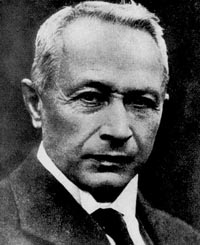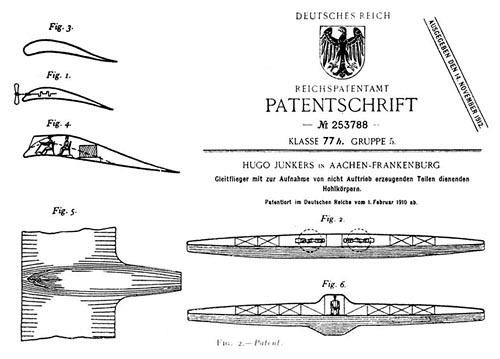| Professor Hugo Junkers |

| ||
|---|---|---|---|
| Home Page | Airmen Index | ||
 |
|||
|
Prior to 1910, Professor Hugo Junkers made his living from the manufacture of heating appliances. Then, at the age of 51, he revealed his secret hobby, aviation, and published his "Nurflugel-Patent."
The manufacturer, born on February 3,1859, at Rheydt on the left bank of the Lower Rhine, thus added an aviation research center to his bath water heater factory at Dessau. The year after World War I broke out, on December 12, 1915, the Junkers Ju-1, with its metal cantilever wings, made its maiden flight amid the general suspicion and alarm of the Allies. By 1918, Junkers, in collaboration with Fokker, had built nearly 400 military aircraft, but from then on he devoted himself solely to passenger aircraft. From the Junkers F "Anneliese," designed in November, 1918, the F-13 was developed, the first Junkers all-metal low-wing monoplane. This passenger aircraft had four seats in an enclosed cabin. The " Junkers-Flugzeugwerke" was launched in June 1919, and the " Junkers Luftverkehrs A.G." in 1924. By 1925, some 178 Junkers machines had carried about 100,000 people over a total distance of 3,000,000 miles. That year the German Government used devious financial means to deprive Junkers of the ownership of his plant, and in 1934 the Nazis took it over completely. A year later, on his 76th birthday, the shy pioneer died. Nevertheless, his reputation continued to be linked with the output of the Junkers factory. His name was also associated with the sensational first east-west crossing of the Atlantic by Hermann Kohl, James Fitzmaurice, and Baron Gunther von Hunefeld, who flew in a Junkers W-33 from Ireland to Labrador, on April 12 and 13, 1928. | |||
 |
|---|
|
Emde, Heiner and Demand, Carlo. Conquerors of the Air: The first non-stop transatlantic crossing from east to west, New York: Viking Press, 1969. |
© The Aviation History On-Line Museum. 2008 All rights reserved.